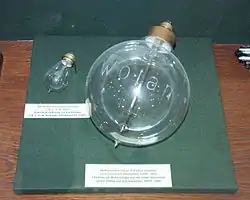Franjo Hanaman
Franjo Hanaman (June 30, 1878 – January 23, 1941) was a Croatian inventor, engineer, and chemist, who gained world recognition for inventing the world's first applied electric light-bulb with a metal filament (tungsten) with his assistant Alexander Just, independently of his contemporaries.

Franjo Hanaman (seated) and Alexander Just
Franjo Hanaman was born in the village of Drenovci in Slavonia (at the time Kingdom of Croatia-Slavonia, Austria-Hungary) to a Croatian family as a second child of father Gjuro Hanaman and Emilija Mandušić.[1]
Hanaman and Just were granted the Hungarian Patent #34541 on December 13, 1904 in Budapest.[2] His invention of tungsten filament was also applied in improving early diodes and triodes.

Right an Just–Hanaman light-bulb, Budapest, 1906.
He died in Zagreb (at the time Kingdom of Yugoslavia).
References
- Moser, Josip (January 2002). "Franjo Hanaman i njegovo djelo" (PDF). HEP Vjesnik (in Croatian). Hrvatska elektroprivreda (132): 11–13. Archived from the original (PDF) on 2014-07-14. Retrieved 2014-07-06.
- "Text of Patent" (PDF) (in Hungarian). December 13, 1904. Retrieved 2009-01-04.
This article is issued from Wikipedia. The text is licensed under Creative Commons - Attribution - Sharealike. Additional terms may apply for the media files.